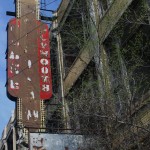Chicago: The Town Barackonomics Shut Down
 Chicago, where I'm visiting this week, is suffering from this recession more than almost any jurisdiction outside the Ground Zero "sand states." The magnitude of distress is visible even to the casual visitor.
Chicago, where I'm visiting this week, is suffering from this recession more than almost any jurisdiction outside the Ground Zero "sand states." The magnitude of distress is visible even to the casual visitor.
Chicago, where I'm visiting this week, is suffering from this recession more than almost any jurisdiction outside the Ground Zero "sand states."
According to the Illinois Department of Employment Security, the unemployment rate in the Chicago metropolitan area hit 11.3 percent in June. This high level of unemployment has also increased the number of foreclosure filings in the area. According to a recent RealtyTrac report, this high level of unemployment has created a 30% spike in foreclosure filings for the first six months of the year compared to the same period last year.
This magnitude of distress is visible even to the casual visitor. Restaurants are uncrowded, unlike insular Washington DC. Construction is non-existent. Off the main thoroughfares, dark storefronts punctuate the streets. Through my hotel window, I am staring as I write at a new glass tower with at least 10 unoccupied floors.
The city of Chicago has sold its future revenues from parking meters and from a city-owned skyway to private operators in order to obtain cash now. It makes sense to liquidate assets to retire debt. But Chicago has used the money raised from assets to cover current spending - an emergency measure that accelerates the city's trend toward even deeper trouble tomorrow.
As of March 31, Illinois has received more than $8 billion in federal stimulus dollars, according to Recovery.gov. Beneficiaries report direct creation of almost 65,000 jobs with the funds. For those of you without calculators at hand, that's a price tag of more than $123,000 per job created.
Economists will suggest that the money has created jobs indirectly too: those lucky 65,000 people must buy groceries, pay rent, repair their cars and so on. But looking around, those indirect effects sure don't seem very impressive.
No surprise then that fewer Americans now believe that the president's stimulus has helped the economy. The latest Washington Post/ABC poll finds:
Among all adults, three in 10 say the government's efforts to stimulate the economy have helped, with about one in 10 seeing "a great deal" of progress from the government's efforts.
Fewer of those polled credit the stimulus program with helping the economy than did so last fall (37 percent said the program was helping in November, compared with 30 percent now). Those numbers are now about on par with those from last summer. Nearly half (49 percent) say the program has made no difference, up 10 points since November, while one in five (20 percent) say the package has damaged the economy.
The city of the Chicago Cubs knows a lot about holding onto hope - but not even Chicagoans can hold on forever.